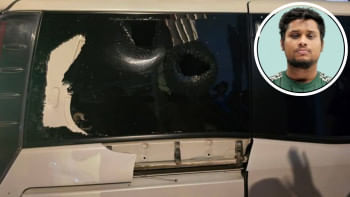Tofail blames banks for loan defaults
Industries Minister Tofail Ahmed yesterday blamed the banking practices for loan defaults saying that delay in sanctioning credits, working capital along with high interest rates are the prime reasons for borrowers' delinquency.
"There are so many examples of banks taking up to a year to sanction loans and sometimes they take another year to provide working capital to the industries. The process is also too much complicated," said the minister.
Tofail was speaking as chief guest at the two-day workshop on "Social and Environmental Performance in Textile and Garment Exports" organised by Bangladesh Textile Mills Association (BTMA) in collaboration with the Commonwealth Science Council, London and the Asian Productivity Organization, Tokyo. BTMA president Salman F Rahman chaired the inaugural session of the workshop held at a city hotel.
"Even our present banking laws are not industry-friendly," he said. "We have decided to change the present laws which at present do not allow an industrial unit of a group to take loans if another unit of the same group has classified loans."
Besides, the cost of production is higher due to some unfriendly factors including hartals and poor port management, he said.
"The textile sector in Bangladesh is a growing one, but it faces a lot of problems. We have to be prepared now to face the post-2005 situation."
UNB adds: Tofail said the environment and labour standards are being used by developed nations as non-tariff barriers against the least developed countries.
But Ambassador of the European Union Antonio De Souza Menezes defended EU's strong attachment to core labour standards, human rights and environment protection.
The Industries Minister said social clause, labour standards, environment and eco-labeling are considered new types of non-tariff barriers for LDCs which are highly marginalised by twin process of globalisation and trade liberalisation.
He referred to WTO's Seattle meeting that was dominated by issues like environment and labour standards where LDCs fought for market access to developed countries.
Referring to AFL-CIO instigated demonstration during the WTO meet held in December, he said the same American labour organisation has been pressing for allowing trade union activities in Bangladesh's export processing zones.
"There is no problem in EPZs now, but it seems we're going to create problem there," he said.
Tofail, however, spoke of government's preference in maintaining environmental standards in industries. He named some private sector industries, including BEXIMCO's Industrial Park that maintian high level of environmental standards.
He mentioned Bangladesh's unique success in eliminating child labour from garment sector in a prompt response to the call from importing countries including USA.
Antonio De Souza Menezes said the EU's firm constitutional commitment to democracy, rule of law, human rights and fundamental freedoms is reflected on its strong attachment to core labour standards.
He said European Union favours a joint WTO-ILO high level meeting on trade, globalisation and labour issues.
Souza said civil society in many countries has become increasingly vocal on relationship between trade and environment. Consumers are more and more prepared to exercise their market power, he said.
"Consumers in Europe are very much pushing for applying the EU eco-labelling scheme to imported T-shirts."
Timely adjustment to consumer's concern is the baseline of successful trade and economic development, the EU envoy noted.
Commonwealth Science Council representative Dr Ritu Kumar said Bangladesh is the first among its 36 member countries to launch SPIES programme. She said India, Sri Lanka and Mauritius have also expressed their interests in the programme.
State Minister for Environment and Forest Ashiqur Rahman and BTMA chairman Salman F Rahman also spoke on the occasion.

 For all latest news, follow The Daily Star's Google News channel.
For all latest news, follow The Daily Star's Google News channel. 



Comments